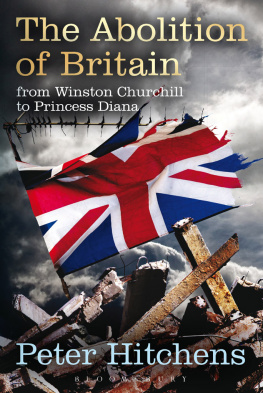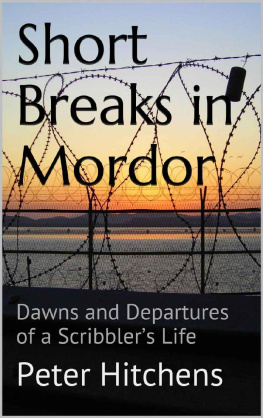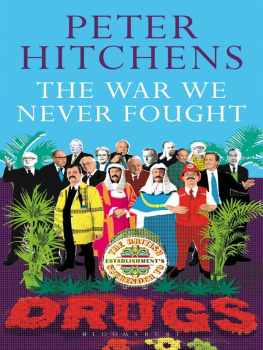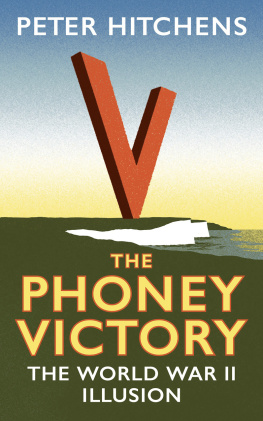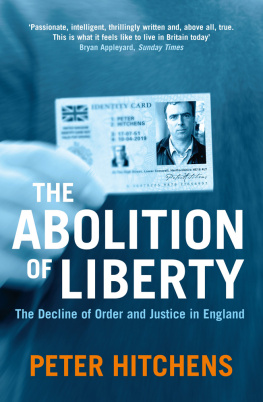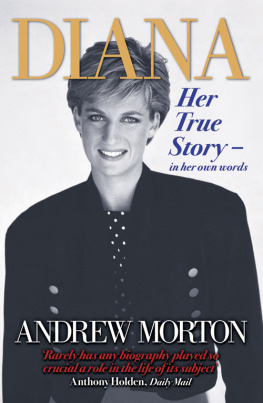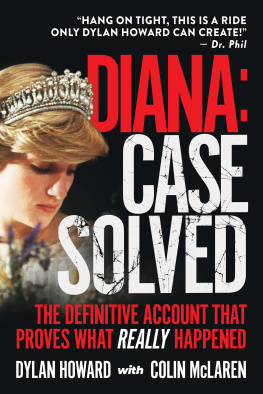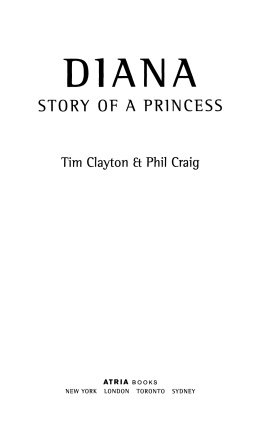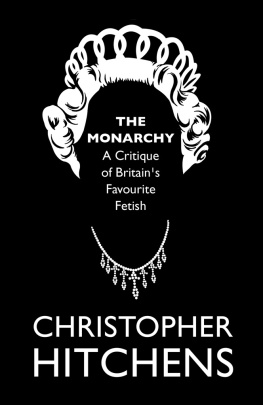A Continuum Book
Bloomsbury Publishing Plc
50 Bedford Square
London WC1B 3DP
www.bloomsbury.com
Bloomsbury Publishing, London, Oxford, New Delhi, New York, Sydney
First published in 1999 by Quartet Books Limited, London
First US Edition published in 2000 by Encounter Books
First published by Continuum 2008
Peter Hitchens, 2008
This electronic edition published by Bloomsbury Continuum 2016
All rights reserved.
No part of this publication may be reproduced or transmitted in any form or by any means, electronic or mechanical, including photocopying, recording, or any information storage or retrieval system, without prior permission from the publishers.
A CIP record for this book is available from the British Library
epub ISBN-13: 978-1-4729-3856-5
To find out more about our authors and books visit www.bloomsbury.com . Here you will find extracts, author interviews, details of forthcoming events and the option to sign up for our newsletters .
For Rebecca, Daniel and Jonathan
It is now ten years since I first tried to set out the ideas in this book. It was quite hard to do. The first agent I approached would not act for me. The next agent was amazed at how difficult it was to find a publisher. Once he had done so, agent and publisher alike begged me to remove a rather harmless chapter comparing the official approaches to two diseases largely contracted through voluntary activities lung cancer and AIDS. They feared that this would arouse such fury that it might destroy the book.
Most reviews were dismissive, some hostile. The Economist distinguished itself by loftily failing to notice the work at all. It later made up for this, in a curious attack on the wildly multicultural Parekh report, which classified Britishness as racist. Such stuff, it said, should be discouraged because it gave support to me and my theories. Quite so.
But by then we had an entire government we still have it openly and actively committed to fulfilling my predictions and confirming my worst fears. It is often painful or embarrassing to read through words one has written oneself, many years before. But when I revisit The Abolition of Britain I am often astonished by the freshness and immediacy of its concerns. Did I really write this so long ago, before my youngest child now nine was even born?
Some of it has come close to becoming conventional wisdom. It is generally accepted, and repeatedly proven by surveys of national ignorance, that history teaching in schools has been eviscerated. The blindingly obvious fact that the school examination system has been diluted is no longer seriously contested, but the great universities of Oxford and Cambridge are still being attacked by ministers for trying to maintain some standards despite this. A parallel assault has been launched on the private schools by a newly potent Charity Commission. Multiculturalism, though everywhere, is officially despised by people and bodies who once promoted it.
The increasingly blatant use of soap operas as cultural propaganda is a commonplace not thought of as particularly striking when set beside the deliberate exaltation of coarseness and ignorance by reality TV shows.
Perhaps most striking of all is the advance of the sexual revolution, the front on which the 1960s generation have always concentrated most of their forces. The extension of morally revolutionary sex education, which deliberately avoids distinguishing between married and unmarried parents, is now proposed for primary classes. One experimental scheme introduces five-year-olds to the idea of same-sex couples through storybooks of a kind which would have been viewed as shocking and impermissible even in 1999.
The almost complete annihilation of lifelong marriage as a recognized form of family has now come about, and in an amazingly short time. Government documents and forms no longer refer to husbands, as a result of a direct and conscious instruction by ministers. The word partner is preferred in official, semi-official and unofficial discourse, because it can be used for married, unmarried and homosexual civil partners alike. Thus language has been altered to obscure a profound change in morals and customs, perhaps the greatest in several centuries. Helen Brooks frosty warning that the parental state would decide what was good for us, which I quoted hesitantly in the first edition of this book, is now a statement of fact. The Human Fertilization and Embryology Bill passing through Parliament as I write this proposes to abolish the previous legal requirement for a child born through in vitro fertilization to have a father.
The most recent statistics show that only 283,730 couples were married in 2005, the lowest absolute figure since 1896. In relation to a population far larger than in 1896, these totals are even worse than they look. Roughly 44% of children in Britain are now born to mothers who are not married. There have been parallel increases in the number of households where nobody has ever been married, where fathers are absent or unknown, where underage children are mothers and women in their thirties are grandmothers.
Contraception and its ugly sister, abortion, are still viewed as the main answer to promiscuity. Despite a moral earthquake in which contraception has gone from being embarrassingly hard to obtain to being thrust upon schoolchildren by indulgently smiling teachers, abortion has continued to increase, suggesting that at the very least contraception does not reduce abortion. Yet contraception is still relentlessly advanced by official propaganda as the best (in fact the only) means of reducing abortion. In a new attempt to reduce the abortion rate, authority has encouraged the widespread use of the morning-after pill. This is an interesting attempt to substitute biochemistry for moral restraint, though not a very successful one. (The drug involved was originally developed to rescue pedigree bitches from the results of illicit encounters with mongrels). But so far even giving this medication away free has had little effect on the abortion tally.
Tolerance, the supposed aim of the sexual revolution, has failed to appear. Intolerance towards sexual unorthodoxy has been abolished. But it has been replaced by a furious intolerance towards those who still believe that heterosexual monogamy is orthodox. Sexual conservatives risk being classified and denounced as cruel bigots. Some have even faced questioning by the police after making broadcast statements criticizing homosexual acts. A Christian couple in Fleetwood were questioned in a menacing manner by police officers after they complained about what they regarded as pro-homosexual propaganda in their local library. Opponents of the sexual revolution are generally manoeuvred into debates on the relatively minor issue of homosexuality, insignificant beside the destruction of marriage. But on this ground, conservatives can be falsely portrayed as intolerant of the person when in truth they are critical of the act, and their views may then be dismissed as a pathological loathing, after which there can be no rational debate. The state is completely partial in this disagreement. Even if they restrict themselves entirely to the central point of marriage, they are not safe from misrepresentation. In this case, attempts to discourage unwed motherhood or encourage marriage are falsely portrayed as plans to persecute single mothers themselves.
On the pretext of resisting child abuse, a flexible term which can cover anything from smacking to sexual molestation or murder, social workers have obtained gigantic power to intervene in families, and each part of the United Kingdom now has a Childrens Commissioner to speak and agitate for more such powers. Parents are under automatic suspicion, close to a presumption of guilt, if children are injured in any way.

